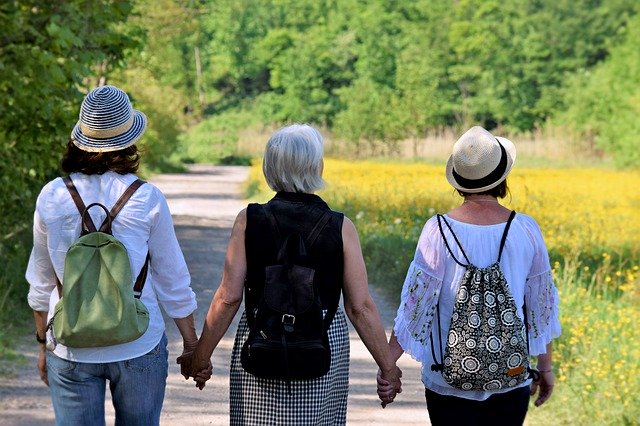Any woman will tell you: any kind of fluctuation in hormone balance within their body brings with it a host of physical, mental and emotional change. From the beginning of puberty, these sometimes very significant changes present women with challenges that can feel overwhelming. For some women, these changes and challenges are taboo, and none more so than menopause.
Unfortunately, in our youth obsessed world, menopause is rarely discussed outside the confines of a doctor’s surgery. You will hear a passing comment, perhaps about hot flushes or unexplained weight gain, but it is a rarity that detailed conversation about menopause is had. In our modern western culture, there is a conceived shame around getting older and entering the menopause stage of our lives. Thankfully though, the tide is turning. There are a growing number of groups online and in our communities that promote open conversation and practical help and support around menopause.
Symptoms of menopause for many women begin about four years before their last period. These symptoms can sometimes continue for another four years after the woman ceases menstruating. Every woman experiences menopause differently. While we associate the beginning of menopause with entering our forties, some women may start experiencing menopause much earlier.
Menopause is a tough enough stage to deal with without other complications, such as pre-existing mental health or addiction issues. According to an article published in Harvard Health Publishing, there is a doubling of anxiety and depression symptoms in menopausal women. However, it states the vast majority of women who experience these symptoms have already had depression and anxiety issues in the past at some point.
It is hard to find large scale studies regarding women in addiction experiencing menopause, simply because the data just isn’t there. In the past, most of the studies on addiction were done on men—therefore, not including physiological or cultural differences that women experience that may lead to their addiction.
However, some evidence suggests that the instance of alcohol and prescription use rises significantly during the menopausal years. There is further suggestion that because of the lack of understanding and misdiagnosis of the medical profession regarding menopause, large numbers of woman receive drugs to treat anxiety and depression, some of which are highly addictive, instead of drugs to treat hormone imbalance such as Hormone Replacement Therapy (HRT).
Despite the research (or lack thereof), my own experience and that of those I have spoken to suggests that mental health issues and substance misuse is very prevalent among menopausal and perimenopausal women. This could be a culmination of things. I think that the middle age is a highly stressful time for most women. Between work, trying to run a home, raising children and then dealing with significant changes in our bodies, life is generally very hard. We are not supposed to embrace our changes according to modern Western culture. We are supposed to fight the aging process and remain forever young. We must be the all-singing all-dancing super woman. We are so conditioned in this way of thinking and being that we lose our balance and turn to something to take the edge off.
So how do we combat the difficulties relating to menopause, and thrive instead of dive?
An article from the Women in Balance Institute states that one of the most important things to influence a woman’s experience of menopause is the culture that surrounds her. Women’s experience of menopause is not universally similar in all ways. Women’s experience differs in how they are treated by the wider community and specifically by men. Even our physical symptoms are different depending on where we live. Of course, our own attitudes and desires for how we want our own menopausal experience to be matters most.
My own story of menopause is one I have had to decide for myself. I am now forty-five years old and in a perimenopausal stage. Yes, it has brought many challenges in many ways. However, I welcome it and embrace it. I most definitely have to be vigilant because of my past experiences with ill mental health and substance misuse. I think that because of these experiences, I have learned tools that better enable me to live a full and healthy life while facing any challenge. Things like acceptance, vigilance, knowing my triggers and noticing my behaviours are all advantageous.
There is help out there—you just have to ask. Diet and the right kind of exercise are paramount when going through menopause. There are two great women who run meetings on In The Rooms who can give advice. Kyczy Hawk, our Yoga expert, (meeting details here) and Lulu Cook, our nutrition, expert (meeting details here) will be happy to take your questions and give excellent advice.
Most importantly, you must decide for yourself what your menopause experience is or will be. Will it be one of endings and sadness, or one of beginnings and wisdom? Good luck on your journey.



2 Comments
Hello Ms. O’Hanlon,
I had not understood the challenges of peri menopause until I experienced them. Sobriety made the process better. I accepted myself, and learned to function. Thank you for writing about these subjects.
One note, though. I believe that you meant hot flashes, but a typo put flushes.
She didn’t make a mistake. ‘Flashes’ tends to be an American term, ‘Flushes’ is European and Antipodean.